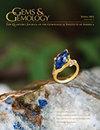已知珠珠的内部结构:养殖的海洋软体动物珍珠
IF 1.6
3区 地球科学
Q2 MINERALOGY
引用次数: 0
摘要
Pinctada maxima(银色金唇珍珠牡蛎),Pinctada margaritifera(黑唇珍珠牡蛎)和Pinctada fucata (martensii)(“akoya珍珠牡蛎”)是商业养殖的Pinctada属的主要软体动物。它们通常用于生产珠珠养殖(BC)珍珠,因此有时也用于生产非珠珠养殖(NBC)珍珠(Otter等人,2014;Sturman et al., 2016;Nilpetploy等人,2018a)。P. maxima是属中最大的品种(Scarratt et al., 2012),通常需要至少两年的生长期才能生产出具有最厚珍珠层的BC珍珠(Gervis and Sims, 1992;Cartier and Krzemnicki, 2016)。在市场上,养殖的珍珠通常被称为“南海”。澳大利亚是白色P. maxima(银唇)养殖珍珠的最大生产国,而印度尼西亚、缅甸和菲律宾是“金色”P. maxima(金唇)养殖珍珠的主要生产国。生产这些珍珠的养殖场位于北回归线和南回归线之间,这与本地的最大贝类的地理分布相吻合。银唇贝主要分布在赤道以南,而金唇贝则分布在赤道以北的地区(Strack, 2006)。在澳大利亚,用于珍珠养殖生产的珍珠主要是根据年度配额收集的野生捕捞的贝壳,该配额考虑到贝壳大小(贝壳长度在120至175毫米之间),并允许捕捞已知的珍珠的内部结构:养殖的海洋软体动物珍珠本文章由计算机程序翻译,如有差异,请以英文原文为准。
Internal Structures of Known Pinctada Maxima Pearls: Cultured Pearls from Operated Marine Mollusks
GEMS & GEMOLOGY FALL 2021 P inctada maxima (the silveror gold-lipped pearl oyster), Pinctada margaritifera (the blacklipped pearl oyster), and Pinctada fucata (martensii) (“the akoya pearl oyster”) are the main mollusks of the Pinctada genus that are commercially farmed. They are routinely used to produce bead cultured (BC) pearls and, as a consequence, sometimes also produce non-bead cultured (NBC) pearls (Otter et al., 2014; Sturman et al., 2016; Nilpetploy et al., 2018a). P. maxima is the largest species in the genus (Scarratt et al., 2012) and generally requires a minimum two-year growth period to yield BC pearls with the thickest nacre layers of all BC pearls (Gervis and Sims, 1992; Cartier and Krzemnicki, 2016). Cultured pearls from the P. maxima mollusk are often referred to as “South Sea” in the market. Australia is the largest producer of white P. maxima (silver-lipped) cultured pearls, while Indonesia, Myanmar, and the Philippines are major producers of “golden” P. maxima (gold-lipped) cultured pearls. The farms producing these pearls are located between the Tropic of Cancer and the Tropic of Capricorn, which coincides with the native P. maxima mollusk’s geographic distribution. The silver-lipped shells are found mostly south of the equator, while the gold-lipped shells populate the region north of the equator (Strack, 2006). P. maxima mollusks used for pearl culturing production in Australia are predominantly wildcaught shells collected in accordance with the annual quota that takes the shell sizes into account (between 120 and 175 mm shell length) and allows fishing INTERNAL STRUCTURES OF KNOWN PINCTADA MAXIMA PEARLS: CULTURED PEARLS FROM OPERATED MARINE MOLLUSKS
求助全文
通过发布文献求助,成功后即可免费获取论文全文。
去求助
来源期刊

Gems & Gemology
地学-矿物学
CiteScore
2.90
自引率
19.20%
发文量
10
期刊介绍:
G&G publishes original articles on gem materials and research in gemology and related fields. Manuscript topics include, but are not limited to:
Laboratory or field research;
Comprehensive reviews of important topics in the field;
Synthetics, imitations, and treatments;
Trade issues;
Recent discoveries or developments in gemology and related fields (e.g., new instruments or identification techniques, gem minerals for the collector, and lapidary techniques);
Descriptions of notable gem materials and localities;
Jewelry manufacturing arts, historical jewelry, and museum exhibits.
 求助内容:
求助内容: 应助结果提醒方式:
应助结果提醒方式:


